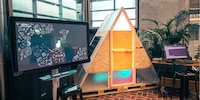
Background information
From a quick browse to a blockchain house: here’s how we equipped no1s1
by Coya Vallejo Hägi

Raspberry Pi is turning ten years old. We owe the DIY computer to one man in particular: Eben Upton.
Equal Opportunity. A topic near and dear to Raspberry Pi co-inventor Eben Upton since childhood. Born in 1978, the Welshman realised early on that equal opportunity starts with education. Looking back, ten years after the market launch of Raspberry Pi, we can conclusively say: Upton’s life’s work has created a more equal world.
During his school years, Upton came into contact with the BBC Micro. These microcomputers produced by Acorn Computers were designed to teach students how to use modern devices. However, at 300 to 400 pounds, they were quite expensive. Adjusted for inflation, this corresponds to around 2000 francs or euros today. Not every school could afford a BBC Micro. It therefore isn’t surprising that they were mainly used by children from wealthy families. Poorer kids were left out.
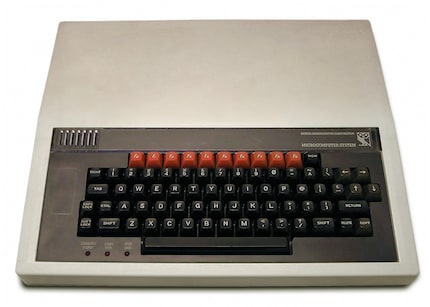
Upton was already bothered by this during his school days. This despite the fact that he had access to the device as a member of the upper class. The BBC Micro therefore had a great influence on him and his later career. He learned programming – awakening his interest in computer science. After earning a bachelor’s degree in physics and engineering, he studied computer science at Cambridge University, graduating in 2001.
Even at the start of the millennium, computers continued to be rather expensive. At the time, Upton was involved in computer research at Cambridge University. He noted that many young students had little prior knowledge of programming.
He saw two reasons for this: first, access to computers was rare due to the financial barrier. More and more people had access to academic avenues, but due to unequal conditions, not everyone came with the same prerequisites. Second, at that point in time, computers no longer needed to be programmed to work at all. A BBC Micro still had to be actively fed with commands. What Upton had learned in school was no longer relevant.
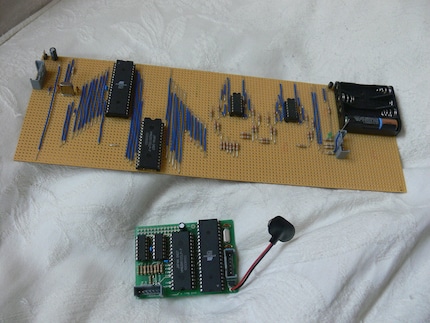
In 2006, Upton built his own computer on a breadboard. His vision: to create an inexpensive computer accessible to all. The device was based on an Atmel ATmega644 microcontroller. Upton noted that it was possible to build an inexpensive computer for programming. However, the prototype wasn’t powerful enough for him.
Around that time, Upton moved from the university to semiconductor company Broadcom, with a set goal in mind: building an inexpensive computer with Broadcom’s semiconductors.
In 2008, Eben Upton and some colleagues founded the Raspberry Pi Foundation. Their goal? Getting kids and teens excited about programming. At that time, there was an acute shortage of skilled workers in the UK. At some point, the Foundation members arrived at Upton’s prototype. That’s where they wanted to start.
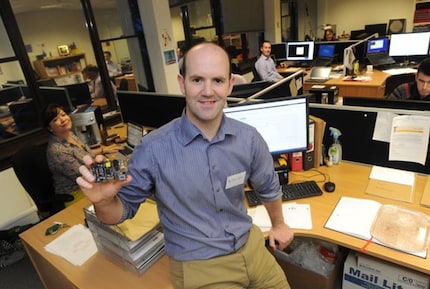
Their hunch: young people would only start programming when they could afford a computer. What was needed was a computer like the one Upton built in 2006. The idea of building a working system that costs around 35 francs or 30 euros was born.
Pricing was essential to Upton. He didn’t just want kids from rich families buying PCs again. Their computer was designed to promote equal opportunity.
After the establishment of the Raspberry Pi Foundation, little happened for a while. Upton was busy with other things and only had time for the Foundation in his spare time.
But then the situation changed fundamentally: thanks to the smartphone boom starting in 2008, powerful and inexpensive ARM processors were coming to market. This made it possible to build a small, inexpensive computer. Eben Upton could finally realise his dream of a computer for everyone. The Broadcom BCM2835 chip was to power the first Raspberry Pi.
In 2011, the leaders of the Raspberry Pi Foundation brought a prototype to the BBC. Their goal: to launch it as a BBC Micro. In reference to the BBC’s microcomputers from the 1980s, of course. However, for legal reasons, this wasn’t possible.
Nevertheless, journalist Rory Cellan-Jones from the BBC made a video of the prototype and its functions. It quickly went viral, showing that there was tremendous demand for just such a computer, even outside of schools.
This was the final push the Foundation needed to make the product marketable. From that point on, everything happened quickly. By the fall of 2011, the Raspberry Pi Model B was created. A computer for everyone – the size of a credit card.
Upton was no longer directly involved in the development of the Raspberry Pi at that time. Instead, he handled various deals for the components. He was determined to have the Raspberry Pi produced in the UK. The computer was to be built where it was developed. However, he didn’t succeed in this venture, instead finding a partner in China for the time being. Thanks to plenty of self-investing, the Foundation members ordered 10,000 models.
Interest in the product seemed huge. Upton and Co. feared they wouldn’t be able to meet demand. Which is why they decided to change their business model. The hardware company became a licensing company. Similar to Arm, the Raspberry Pi Foundation developed the computers, which were manufactured and distributed by electronics distributors Element14 and RS Components.
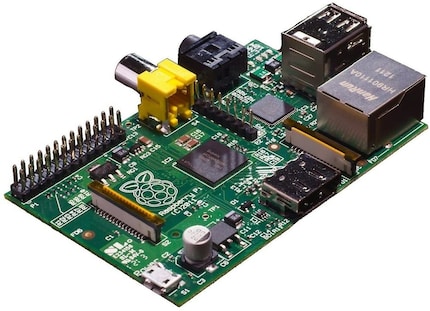
29 February 2012 was the day: the Raspberry Pi was launched at the Embedded World trade fair in Nuremberg. On day one, 100,000 units are sold. Within the first year, even one million. Many customers were hobbyists. Following this huge success, Upton still managed to bring part of the production to the UK in 2012.
Eben Upton tried to unpack this success, stating that Raspberry Pi filled a large market gap that no one else had thought to exploit yet. Or even more accurately: nobody knew there was any demand at all until release. Hobbyists were probably assumed as too small a target group when in truth they make up a sizeable community.
Upton attributes this success with hobbyists to the fact that we’ve become alienated from technology through specialised devices such as smartphones and game consoles. We use technology, but we don’t know how it works. Hobbyists, on the other hand, use technology deliberately. For them, an open and inexpensive system such as Raspberry Pi comes in handy.
Upton was initially frustrated that mostly hobbyists were interested in Raspberry Pi. After all, his goal, and that of the Foundation, was to get young people interested in programming. Raspberry Pi does that, too. But only in a secondary function: hobbyists inspire young people with their projects and encourage them to follow suit.
Today, Raspberry Pi and its successors as well as imitators are no longer only found among hobbyists. They’re often used in other fields too. For example, in 2015, two so-called Astro Pi flew to the International Space Station (ISS). Using them, more than 50,000 children and young people have conducted experiments and sent messages into orbit as of 2022.
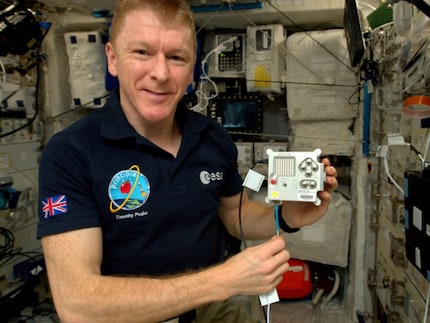
Upton and the Raspberry Pi Foundation have achieved their goal: getting young people excited about programming and the technology behind devices. Or as Upton puts it:
I was enormously privileged in the 1980s. I had access to education and computers. Others were denied this. Today we have the opportunity to do better than we did in the ’80s. We can ensure that those lacking privilege, but with talent and skill, have access to computers thanks to low-cost processors like Raspberry Pi.
This text is based on the interviews «Eben Upton - The Story of Raspberry Pi» and «Eben Upton - Life before Raspberry Pi» of the Centre for Computing History.
From big data to big brother, Cyborgs to Sci-Fi. All aspects of technology and society fascinate me.
Interesting facts about products, behind-the-scenes looks at manufacturers and deep-dives on interesting people.
Show all